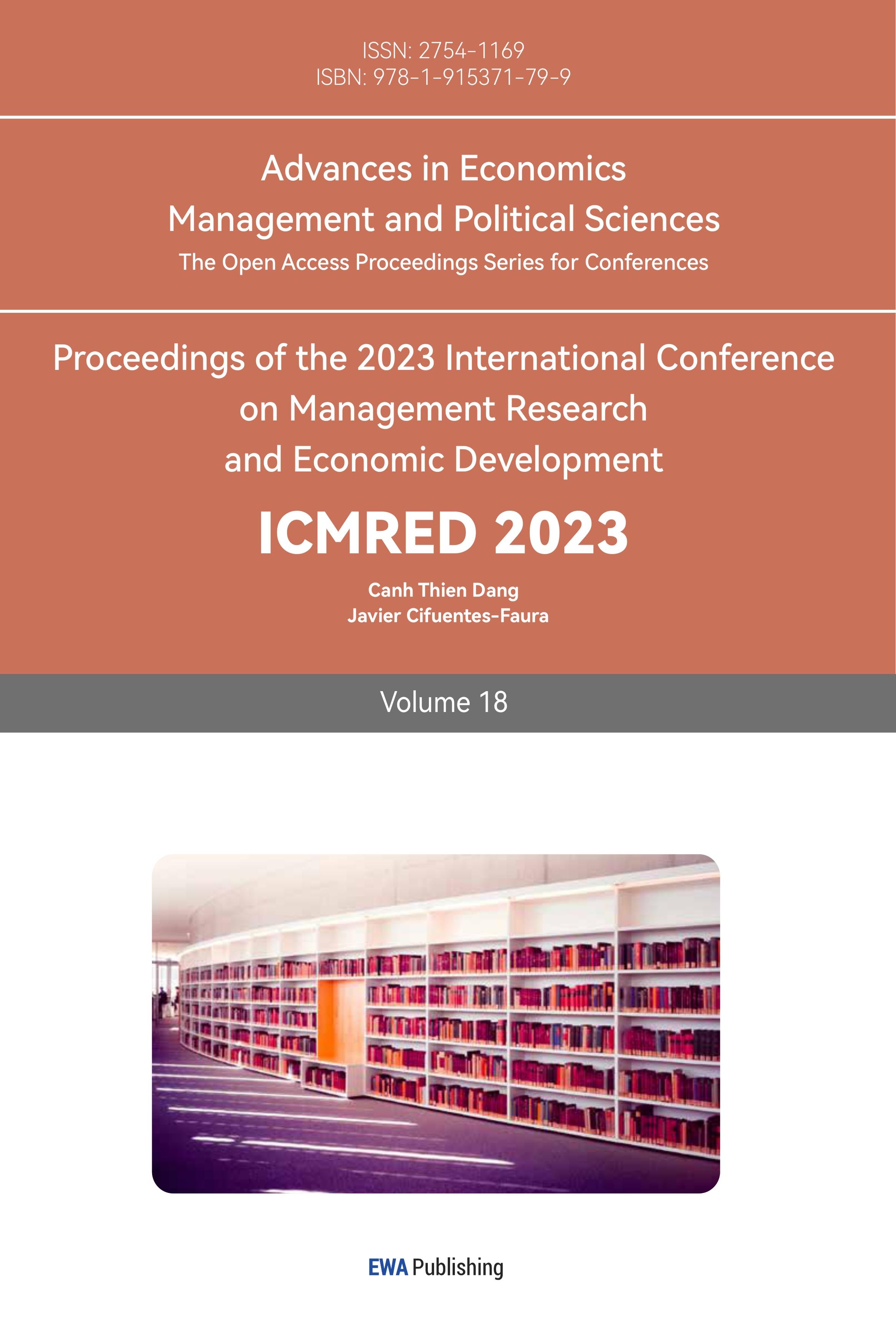1. Introduction
Living in the 21st century, people have more opportunities to shape this world into a better place with rich information technology. Information technology, involving the development, maintenance, and use of computer systems, software, and networks for processing and distribution data, is no longer monopolized by the rich and powerful but covers most of the population. For data, this work borrow the concept of direct and indirect ways in which gender equality affects economic growth from Klasen's study in 1999 and also Kabeer’s study in 2013. In addition, this work borrow women's economic empowerment's five components from Parad, Upadhyay, and Macueve's survey in 2009 to analyze gender inequality. Other professional studies are also used to form and conclude this work’s research results. This essay try to testify to the effect of developing informational technology on the progress of equal rights between males and females in developing countries and on countries' general economic growth.
This essay combines and analyzes previous scholars' studies and uses their results and data to come up with a brand-new conclusion. It considers the issue of the impact of information technology on women's status, which is rarely considered in the essay beforehand.
With the various data from a previously discussed scholar, it is concluded from the work that developing informational technology contributes to the rise of equal rights between males and females in developing countries and an increase in developing countries' general economy.
2. Relationship Between Information Technology, Gender Equality, and Long-Term Economic Growth
2.1. Characteristics of Technology in Improving Long-term Economic Growth and Enhancing Gender Equality in Developing Countries
The gap that exists in many respects between developing and developed countries is often considered hard to bridge. Among them, issues such as gender equality and long-term economic development have been especially difficult to tackle. However, with the emergence and development of the third scientific and technological revolution, information technology has shown great potential in solving the development problems of third world countries. The main point of this paper is that, in most cases, information technology can help reduce gender inequality and promote long-term economic growth. It is therefore essential to recognize the characteristics of information technology and the specific situation of developing countries regarding gender and long-term economic development issues. In addition, a clear understanding of the interlinkages between information technology, gender, and economic development is an essential prerequisite for studying the whole issue.
At its most basic, information technology (IT) is the application of computers to create, process, store, retrieve, and exchange all kinds of data [1]. With its gradual development, its connotation continues to expand but also gives birth to a lot of derivatives and applications. The applications of digital technologies include social media, mobile computing, analytics, and cloud computing [2], which are summarized by the acronym ‘SMAC’ [3]. Knowledge is widely believed to have become the third factor of production after the traditional factors - Labor and capital [4]. Information technology production is an essential factor in the knowledge economy, since it is the leading promoter of the knowledge economy and that it is itself highly knowledge intensive. With the expansion and application of information elements, the information industry has gradually become independent and become one of the essential pillars of the national economy. In this industry, information technologies were used to collect, sort out, store and transmit information, provide information services, and provide corresponding information means and information technology services. Many developing countries are looking for ways to promote the development of the knowledge economy, especially the information technology industry. Figure 1 shows a reliable and clear trend concerning the changes of the output value of China's information industry in recent years. Take China as an example, the figure shows that from 2016 to 2020, except for 2018, the growth rate of the output value of the information industry was above 8%, and the total social investment in the industry also increased year by year, which also reflects the importance of the information industry to developing countries from one aspect.
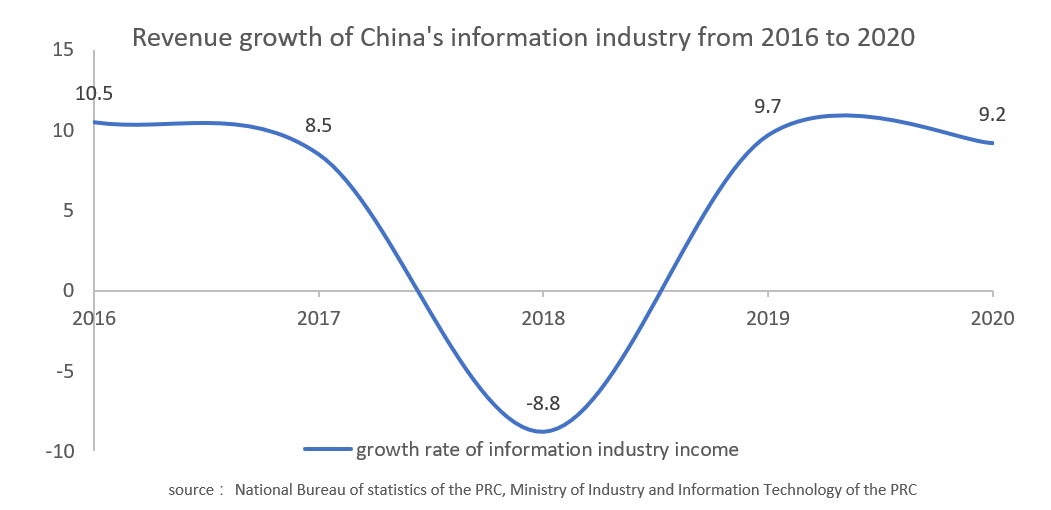
Figure 1: Revenue growth of China's information industry from 2016 to 2020.
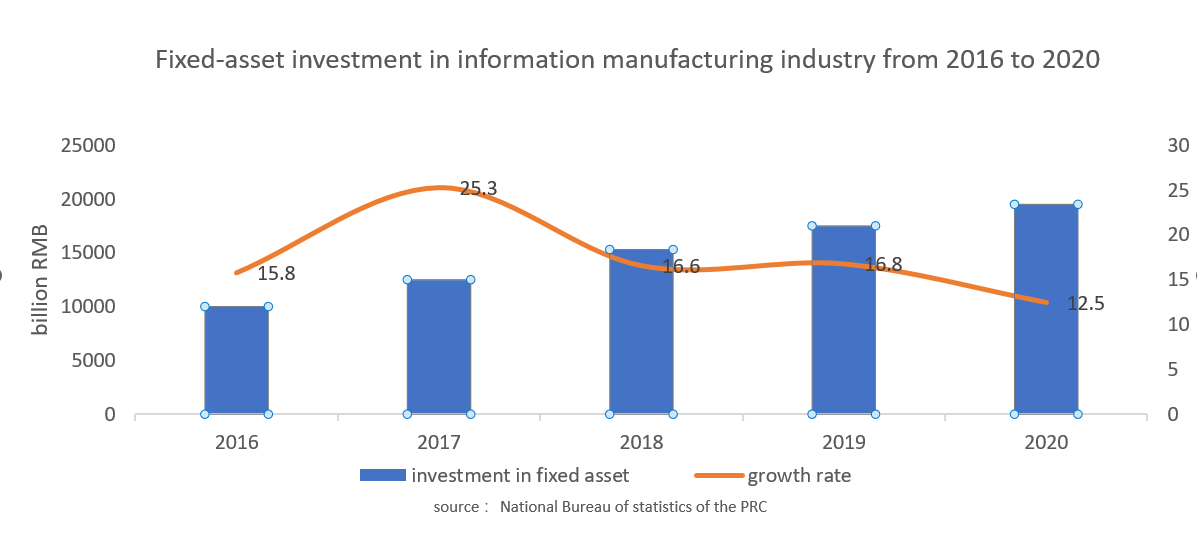
Figure 2: Fixed-asset investment in information manufacturing industry from 2016 to 2020.
Information technology, with the characteristics of high speed, digitalization, networking, broadband, intelligence, and media, has shown significant advantages in information communication, thus changing the operation mode of organizations and improving the production efficiency of organizations. New information technologies such as chassis, communications, manufacturing, and imaging systems can increase the degrees of freedom associated with organizational design by providing opportunities for previously impossible organizational structures and functions [5](see Figure 2).
In addition, the industrialization of information technology has also significantly impacted gender and economic issues. Although economic normality is not entirely synchronized with gender equality, women's social discourse rights can be further improved by weakening personal attachment relationship through economic growth. With the progress of information technology, the gap in demand for information technology-related talents is expanding, and the proportion of female practitioners in the information industry is increasing, which will help improve women's status.
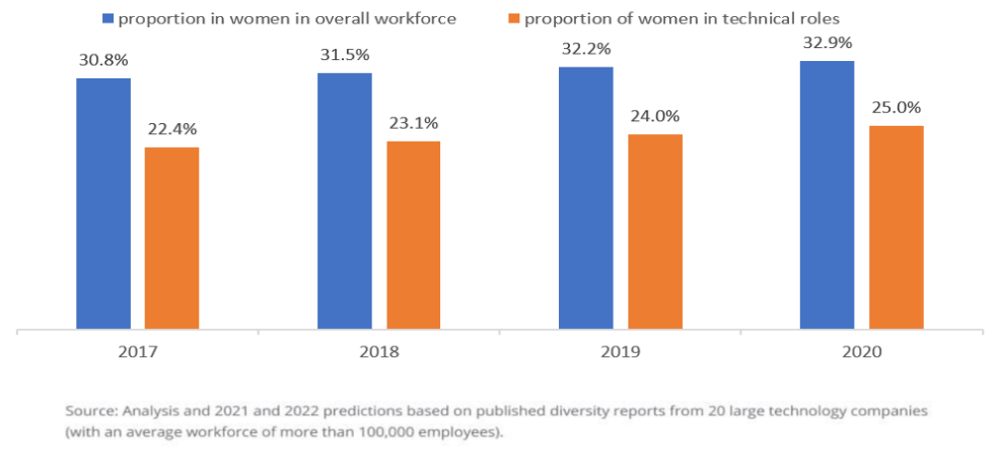
Figure 3: Proportion of women in overall workforce and in technical roles.
2.2. The Role of Information Technology in Helping Enhance Gender Equality in Developing Countries
Despite the rare cases where technology harmed gender equality by disseminating patriarchal beliefs, exaggerating false news, and so on, the development of information technology has positive effects on enhancing gender equality in developing countries that overweight the unpleasant side. It is especially beneficial in terms of empowering women through the economic aspects. Women's economic empowerment constitute five core indicators: "women's sense of self-worth, women's right to have and make their decision, women's right to have access to opportunities and resources, women's right to have the power to control their own lives (both within and outside the family), and women's ability to influence the social change to build a more equitable and just social order both nationally and internationally" [6].
First, information technology makes women aware of their self-value by reshaping public opinion. For example, social media users share their life and opinion online frequently. Moreover, female celebrities' posts are especially powerful in showing the success, attention, and influence women bring to society. The exposure to various information globally inspires women to realize their self-worth and may even change some women's ideology.
Second, information technology gives women the right to make choices and control their own lives by enabling them to access education and health information and improve their economic condition. Unusual circumstances such as the COVID-19 pandemic hinder the government's provision of quality education for girls in developing countries. However, with the help of information technology and certain online learning platforms, girls can continue learning without much disturbance. Education is the key step for the younger generation to eliminate stereotypes and abandon unjust traditional views of women in the future. In addition, more women have access to proper health education or health services. For example, women that live in remote areas can now consult with doctors online easily and research information about their problems. More importantly, information technology gives women more working opportunities. The Internet and technology create job opportunities in the digital economy. Now there are timesaving, convenient, and various job choices for women. Women who are knowledgeable and financially independent are powerful.
Third, information technology allows women to influence the world by empowering them politically and changing the traditional social norm. Information technology provides platforms for women in developing countries to participate in political events such as elections and learn about global news. With this information, women's horizons are extended. In addition, information technology allows women to connect with activists and form their organizations to voice their needs. Moreover, news reporting gender inequality issues and information disseminated online raises awareness. A million posts on feminism and anti-sexism show the disappearance of traditional social norms regarding women and the gradual move to a new equitable society.
Data collected by the World Bank supports these theoretical claims. China is a classic example of a developing country that experiences rapid economic growth and has a traditional view against gender equality. Figure 3 shows that China's internet users increase from 1990-2018. Within 28 years, the percentage has increased significantly from 0% to 59%, demonstrating the establishment and introduction of information technology in China [7]. This increase in Chinese citizens' access to information technology improved women's living conditions in many aspects, as indicated in the following graph. Figure 4 shows the gradual increase in Chinese women's life expectancy at birth from 1990-2018, from 71 to 78 years old, reflecting the improvement in women's health care sectors [7]. Figure 5 demonstrates more indicators of gender inequality. Within that time, the adult female literacy rate increased from 68% to 95%; youth female literacy rate increased from 95% to 100%[7]. The improvement in these two indicators suggests the improvement in women's social status, which gave them more access to quality education.
Meanwhile, the women's business and law index score increased from 59.4-75.6 [7]. As stated by the World Bank, this index "measures explicit discrimination in the law, legal rights, and the provision of certain benefits, areas in which reforms can bolster women's labor force participation" [7]. The introduction of information technology to China has benefited women and significantly closed the gender inequality gap in developing countries (see Figure 6).
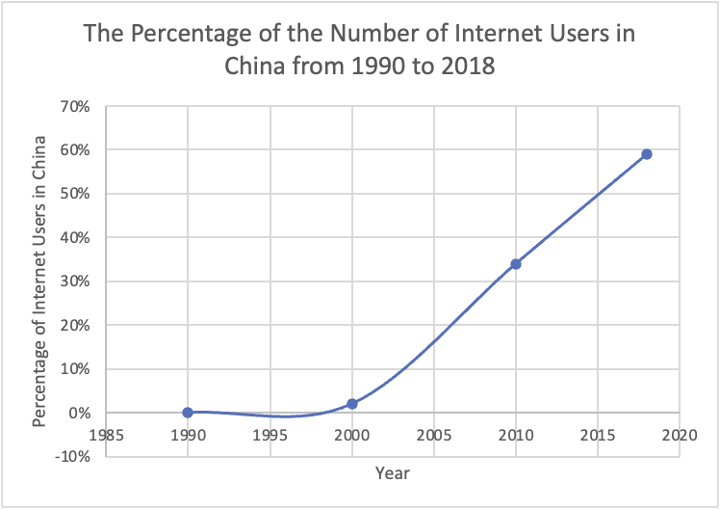
Figure 4: The percentage of the number of internet users in china from 1990 to 2018, data extracted from the World Bank official website.
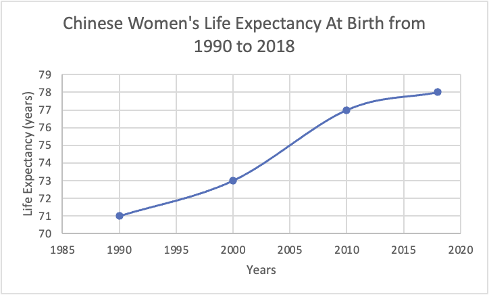
Figure 5: Chinese Women’s Life Expectancy at Birth from 1990 to 2018.
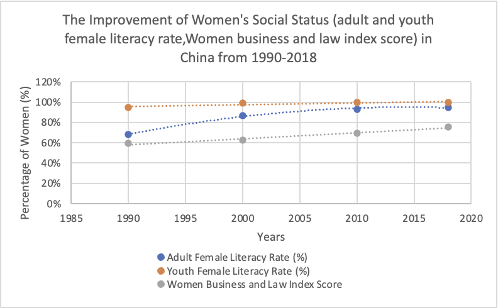
Figure 6: The Improvement of Women’s Social Status in China from 1990-2018.
2.3. The Role of Information Technology in Improving Long-term Economic Growth
With the development of the third industrial Revolution, information technology has made great progress and become more popularized, and its application in the economic field has been more and more extensive. In this context, information technology will positively impact long-term economic growth. At the level of technological progress, the digital economy era has strengthened the ways to promote economic growth, such as optimizing factor allocation, upgrading factor combinations, and improving production efficiency. They influence and complement each other, and eventually form a joint force to promote the long-term iterative rise of social and economic productivity. For developing countries, using information technology can better stimulate their latecomer advantage. Due to price declines, some developing countries are beginning to benefit from the expansion of IT and the Internet in advanced countries simply because they can purchase cheaper infrastructure than was once required. One example of cost decline is the lack of current need for firms and universities to set up and run their LAN for the Internet. Firms can lease server space in ''Internet Hotels'' in neighboring regions. In the future, it should be possible to create a ''virtual LAN'' for any institution or individual on the servers of one or more ISP, so there need be no need for in-house servers, in-house server maintenance, and in-house connectors and switches [8]. Besides the supply side, the demand side of the IT industry is quite promising. In East Asia and the Pacific, the share of high-tech products in manufactured exports is as high as 28 percent. In the case of India, its software exports in 2000 exceeded $4 billion, or about 12 percent of India's total exports. Costa Rica's economic growth rate surged to 8.3 percent in 1999, driven mainly by exports from the microchip industry, which accounted for 38 percent of the country's exports [9]. In general, information technology has promoted the long-term economic development of developing countries in the following three aspects.
First, information technology triggers changes in production processes within production organizations. The popularization of information technology enables enterprise employees to have more convenient ways of working. Many new information programs have entered the APP market, such as Zoom, which enables managers of companies around the world to communicate smoothly for the first time. Especially in the current epidemic era, some countries have enacted quarantine policies, and the situation of online work has made a great contribution to reducing the loss of the company.
Second, Information technology facilitates international trade. The penetration of big data, artificial intelligence, cloud computing, blockchain, and other information technologies into the trade sector has brought about changes in trade methods and trade objects and spawned new forms of foreign trade, such as cross-border e-commerce and digital trade. Digital trade aims to take digital information as a trade's target through digital exchange technology and realize the exchange of traditional physical goods, digital products, and digital knowledge and information. Digital trade has brought about the platformization of transactions, reduced intermediate trade links, lowered trade costs and barriers, expanded the trading scope of commodities, extended the length of global value chains, changed the trade flow patterns of subject matter, and provided more channels for SMEs in developing countries to integrate into global value chains. At the same time, digital trade weakens information asymmetry and soothes economic circulation. The real-time tracking system of the industrial chain and supply chain improves the transparency of the production process and circulation process.
Third, information technology will give birth to new industries, transform the traditional industrial layout, and inject new blood into economic growth. The development of information technology has given birth to new industries, squeezing the development of traditional industries to some extent. However, a more competitive economic situation has emerged after combining traditional industries and information technology. The traditional bicycle industry has made the sharing economy possible through GPS smart networking and offline apps. In addition, with the combination of information technology and industry, using the Internet of Things technology, industrial enterprises can connect machines and other production facilities to the Internet, and build a networked physical equipment system (CPS), so that each production equipment can automatically exchange information, trigger action and implement control. The e Internet of things technology helps to speed up the perception, transmission, and analysis of real-time data information in production and manufacturing and accelerate the optimal allocation of production resources. After informatization, traditional industries can not only meet the needs of consumers but also provide convenience, accelerate market circulation and boost long-term economic development.
2.4. The Relationship Between Gender Equality & Improving Long-Term Economic Growth
Klasen’s study in 1999 suggests two ways, both directly and indirectly, in which gender equality is likely to impact economic growth positively. Direct ways refer to the optimal use of labor, where society recognizes women’s ability and talent, thus allowing them to participate fully in the market. Indirect ways refer to the positive externalities of gender equality on households and society [10].
Figure 7 shows that Indicators of gender equality are essential in examining the mechanism behind how improvement in gender equality impacts both direct and indirect ways of economic growth. Indicator of gender equality consists of women’s access to quality education, health service, equal participation in the market and society, and equal pay to men.
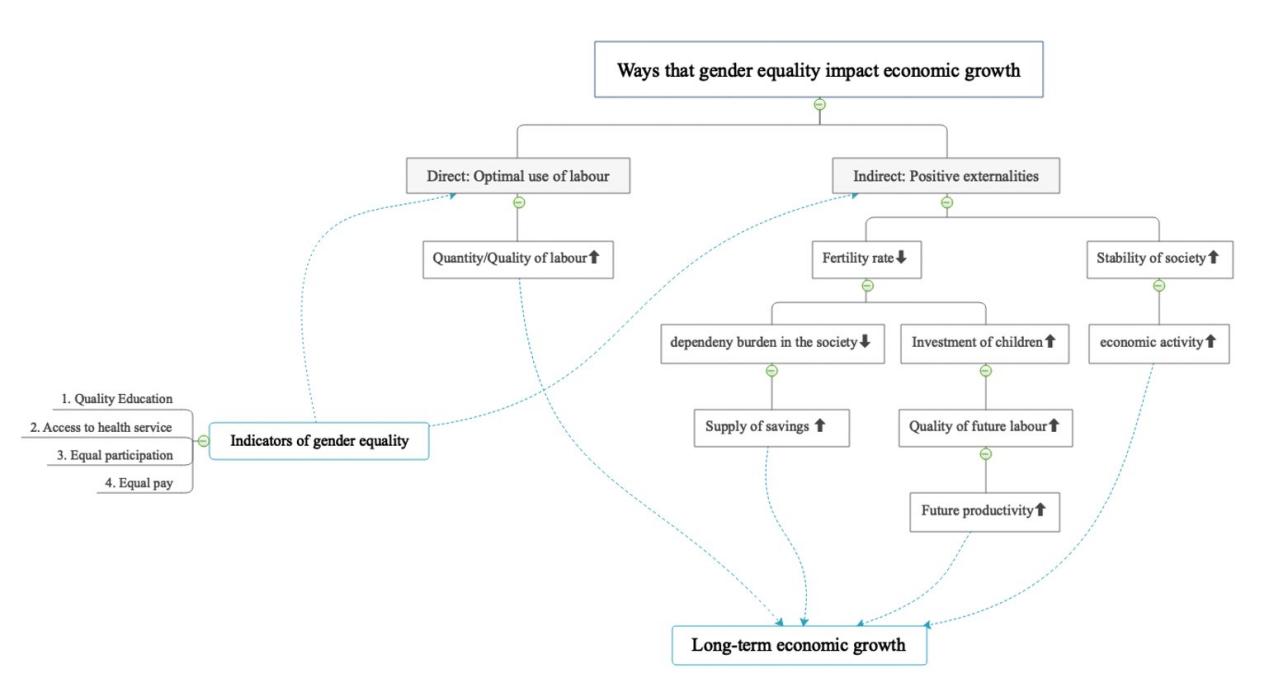
Figure 7: Ways that Gender Equality Impact Economic Growth.
As society develops and improves these four aspects of women's lives, the labor force is optimally used. First, the quality of labor improves when women receive a better education. Quality education allows women to acquire abundant knowledge and train their mathematic skills and other essential skills such as conducting research, writing reports, cooperating in a team, and so on. These skills enable women to perform more professionally at work, which allows a developing country to shift its economic sector from primary industry to tertiary, even quaternary industry, to generate higher profits. Second, women with access to health services live longer, thus increasing the quantity of labor. A decrease in death caused by accidents and serious diseases with mistreatment creates a more sustainable labor market with higher productivity. Third, traditional views and stereotypes discourage women from participating in work, which results in poor use of the labor force. Society is not using all potential labor force effectively nowadays in some developing countries due to discrimination against women. If all women could participate in work commercially or politically and have equal opportunity, then both the quality and quantity of labor would increase. Lastly, the effect of equal pay between men and women on long-term economic growth is sometimes controversial. Seguino's study in 2010 mentions that the wage gap between male and female workers attract more foreign investment for the developing country under circumstances where the wage gap is wider than the productivity gap, which in turn raises profit and boosts economic growth by exporting more goods[11]. However, Seguino notes that reducing the wage gap and raising gender equality in low-income agricultural countries can create an incentive for women to produce more food, reducing food imports and increasing food exports. This can improve the balance of payment of the developing country and stimulate long-term economic growth. In short, as all indicators of gender equality improve, the quantity and quality of labor increase, stimulating long-term economic growth.
In addition, a more gender equitable community brings positive externalities to individuals and society. To illustrate, the fertility rate decreases as women acquire more knowledge, access health services and receive equal treatment at work. By enabling women to be knowledgeable, healthy, and financially independent, unexpected pregnancy and the fate of becoming a fertility machine for the family are avoided. The decrease in fertility rate brings two benefits. First, the dependency burden on individuals and society lightens as fewer children are born, which increases the supply of savings for households. More money savings means more potential investment capability, contributing to long-term economic growth. Second, the investment in children increases since fewer children are born. Each child will receive better education and more parental attention and care. The vast opportunities children have allowed them to be skilled and improved the quality of the next generation's labor force, which boosts future productivity and thus ensures long-term economic growth. Besides, enhancing gender equality shapes a stable society that fosters more economic development. Conflicts and riots create an intense atmosphere that deters foreign investors from investing in the country and make its citizens lose confidence. This not only reduces international trade and extensive cooperation between countries, but it also reduces domestic investment and production. Overall, enhancing gender equality facilitates economic growth directly and indirectly.
3. Measurable Impacts of Information Technology on Gender Equality and Economic Growth
3.1. Development Trend of Information Technology in Modern Society
In modern society, with the strengthening of the import of information technology, the development of the country's industry, manufacturing, and so on. In addition, Invest Information Technology has also helped increase each country's GPA. In this part, the study includes different figures and graphs to show how information technology and technology investment cause economic growth in developing countries. On the other hand, information technology can also reduce gender inequality.
3.2. Correlation Between Information Technology and Economic Growth
In the first part, the study includes a two-dimensional line chart using a sample of China from 2007 to 2022. This chart shows the correlation between Technology and Economic growth. Figure 9 shows the GDP of Information Technology in the Tertiary sector of China, and this data shows what information technology will bring to China’s economic growth since the factors of GDP includes government spending. In the long term, government expenditure will be arguably affected by factors such as the pandemic (COVID-19), high inflation, unemployment, and so on. This endogeneity is not easy to overcome.
China is a particular sample of developing countries, and it is the largest developing country in the world. Therefore, this analysis cannot be used to represent all developing countries. The main reason why the study includes this country is that it has complete data for the investigation compared to other developing countries. Moreover, this data is after China joined World Trade Organization in 2001, which means there should be a gap between 2000 and 2001, but the work failed to obtain the data. If so, this work’s hypothesis will be more sensible.
In the second part, the work include a graph with the relationship between Gender Equality Index determined by four factors: Economic Opportunity, Education, Health, and Political Power. This study uses data from many countries (155) to analyze the relationship between technology and gender equality. It is concluded that developed countries can be the data to reference based on the data. This data assumes that other years had the same trend as 2021.
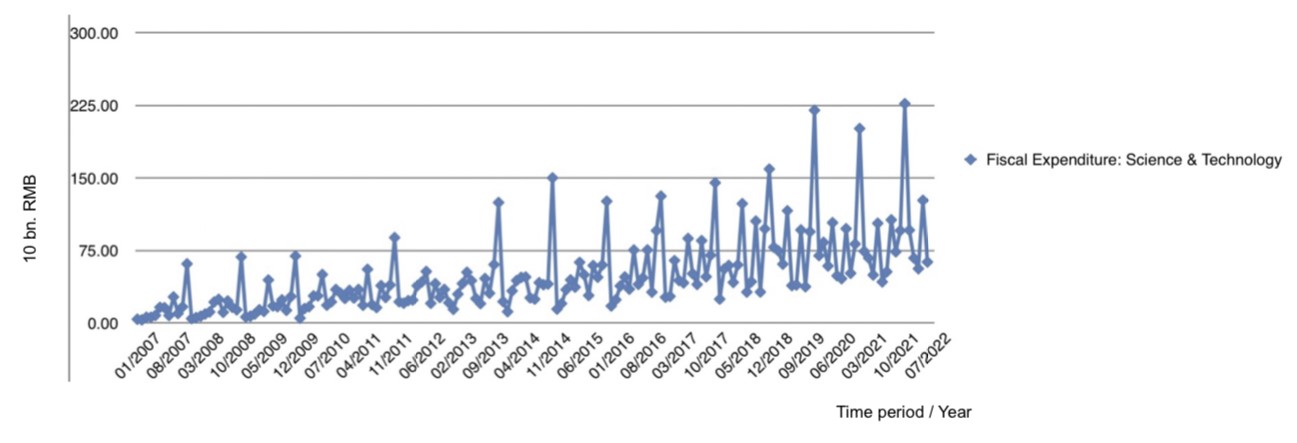
Figure 8: Fiscal Expenditure: Science & Technology [12].
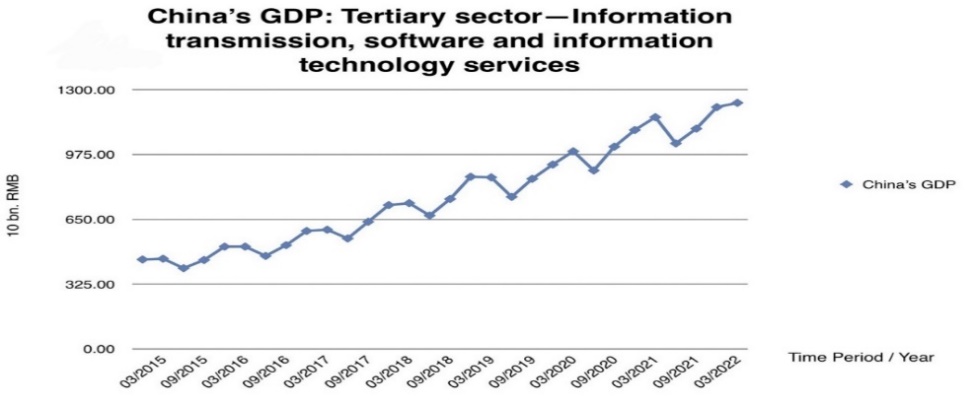
Figure 9: China’s GDP: Tertiary sector-Information transmission, software and information technology services[12].
Figure 8 reports the fiscal expenditure for the 2015-22, ordering the spending around twice yearly. The x-axis represents the Period, and the y-axis represents the government expenditure using ten bn. RMB to count. This graph highlights the positive relationship between Period and expenditure. Additionally, it emphasizes the confidence in increasing the Chinese government's absolute advantage of Science & Technology. Not surprisingly, this trend is continuing to increase.
Figure 9 reports China's GDP for Information technology. The x-axis represents the Period in Year, and the y-axis represents the currency. Frequency of statistics in a quarterly(March, June, September, and December) [12]. Similarly, it shows an upward trend.
To sum up, there is a positive correlation between information technology and economic growth. Information technology has driven economic growth, which is also reflected in GDP.
3.3. Correlation Between Information Technology and Gender Equality
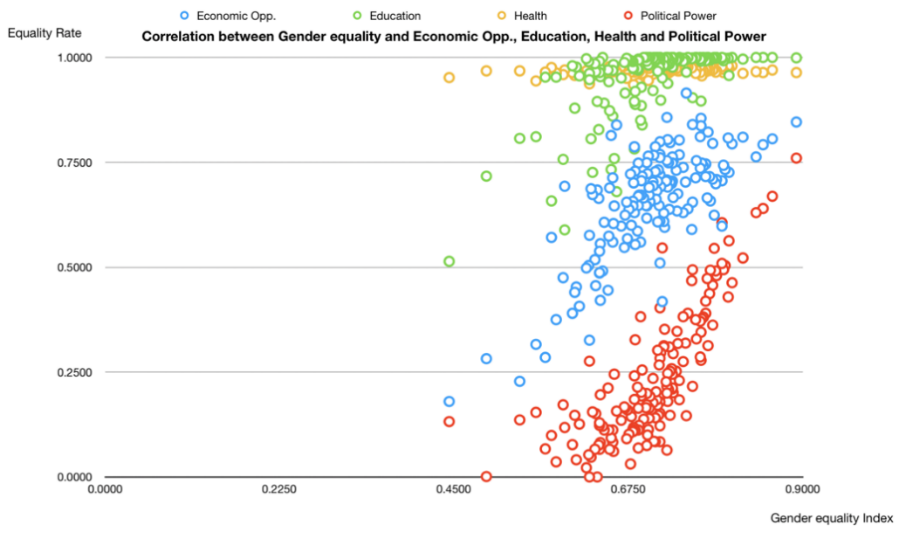
Figure 10: Correlation between Gender Equality and Economic Opp., Education, Health and Political Power.
Figure 10 includes data for 155 countries. In addition to developing countries, data for many developed countries are included here, using as a comparison in the study. The x-axis represents the gender equality index, and the y-axis represents the equality rate for Economic Opp., Education, Health, and Political Power. Every country has four measurements in 4 different colors. Furthermore, each country’s data is on one x-axis.
In figure 10, developed countries is always on the right side(high gender equality) and have a high equality rate for the four factors shown above. People with a high economic opportunity, good education, healthy body, and high political power always have more chances to use information technology. Therefore, conversely, the country where both women and men are familiar with information technology has high gender equality. From a normative point of view, information technology could be a way to show the gender equality rate.
3.4. How Online Activity Narrowing Gender Gap?
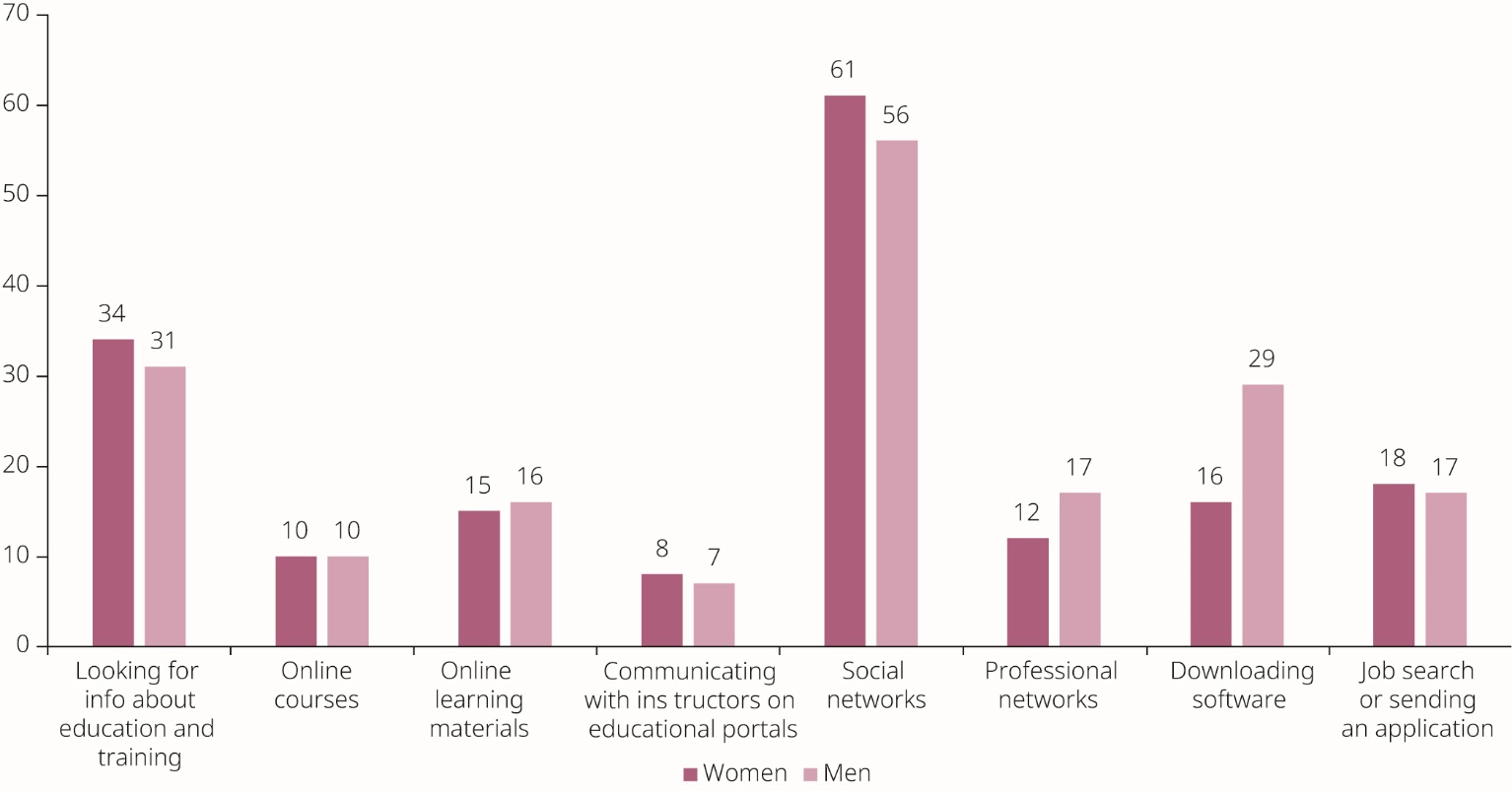
Figure 11: Percentages of people (aged 16–74) who engaged in certain online activities in the past 3 months for private purposes in the EU, by sex [13].
Women and men have all kinds of online activities. Men generally prefer to participate in professional Internet research, software, etc. Women outpace men in social networking and searching for information on education and training. In general, women's Internet use has caught up with men's.
The degree of Internet use for learning purposes shows a gender gap. Generally, women are more likely to search for learning, education, and training courses. Sweden, Finland, Estonia, and the UK have the highest proportion of women using e-learning activities. However, women in Bulgaria and Romania have the lowest participation rate, which may be because information technology is not developing fast enough in Bulgaria and Romania. This chart shows that women and men are equally likely to look for jobs or send applications online. (18% and 17%) This online activity is most popular in Denmark (37 %), Finland (32 %), and Sweden (30 %).
Figure 11 shows that as the Internet becomes more and more developed, women are using the Internet more and more. Women and men use it almost equally. This also means that technology reduces gender inequality.
3.5. Digital Economy, Gender Equality, and Society
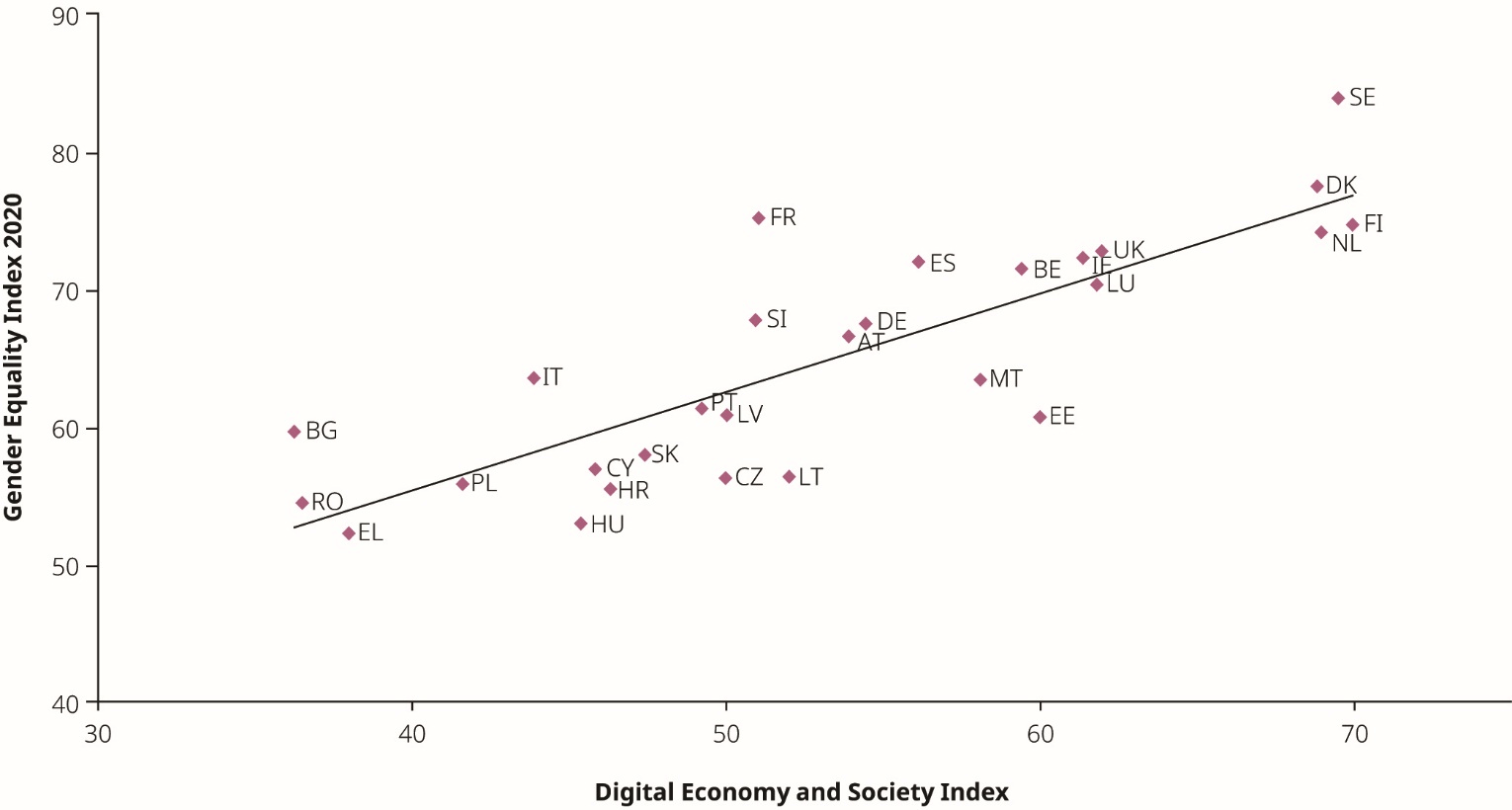
Figure 12: Relationship between the gender equality index and the digital economy and society index [13].
The index of the relationship between gender equality and the digital economy and society shows that a gender-equal society will also fare better in the digital economy
In this age of scientific and technological development, the economy develops rapidly. With the development of information technology becoming more and more mature, the relationship between information technology and economic development is becoming closer and closer. When people begin using information technology to obtain economic sources and invest, a Digital economy will emerge. The Digital Economy is also a source of economic income that information technology brings to a country, a society, or an individual. People can use the Internet to conduct some economic transactions and so on. The Digital Economy has also become an essential part of how information technology can help economic development.
The relationship between the Digital Economy and Society index and the gender equality index suggests that improving Internet use while addressing gender inequality is possible. At the same time, people can use the Internet to eliminate gender inequality. (such as providing people with equal education through information technology, entrepreneurial opportunities, communication technology, etc.) Progress on a digital transformation can thus go hand in hand with progress on gender equality.
In Figure 12, Finland, Denmark, and Sweden are all at the higher end of the Y-axis (Gender equality Index). The economies of these countries are also relatively good. From this phenomenon, it’s concluded that when a developing country starts vigorously developing information technology, it will significantly improve the country's GPA and make economic growth.
In this part, the paper includes different charts to express the impact of information technology on the economy of a country or multiple countries, the impact on society, and information technology on gender. Figures 8 and 9 show China's relevant technological and economic development. When China began to develop information technology, China's GPA continued to increase every year. From Figure 10, it’s clear that information technology has demonstrated gender equality in modern society in various ways (Education, Health, and Political Power). Figure 11 shows that when people in a country use information technology more and more frequently, their gender equality decreases. Figure 12 compares economic development and gender equality trends in many different countries. These countries include both developed and developing countries. Apparently, the trend of gender equality in a country is closely related to its economic development. Furthermore, when a country is increasingly developed in information technology, its economy and the trend of gender equality will increase.
To conclude, all the above studies support this work’s hypothesis. More and more developed countries are beginning to introduce and use information technology. No matter what country or society, information technology is closely related to economic growth, gender equality, and society. When a country or society begins to develop information technology, its economy will grow, and gender inequality will become less and less. This means that when developing countries start to develop technical information, it can promote economic growth and reduce gender inequality.
4. Conclusion
One of the weaknesses of this paper is that some of the data the paper used may not be directly related, which means that there are other factors within the data that might affect the result. Also, this work heavily relies on the given information and do not perform field research directly, which could be a potential issue considering the validity. Nevertheless, the strength of this research essay is that this work is universally applicated to a great extent; this work considered data from more than 150 countries to make this research not limited to a specific region or culture. Also, this work primarily uses the most recent data and tries to avoid the old, last-century data.
Information technology does help enhance gender equality in developing countries and improve long-term economic growth, according to the work’s analysis of data from various resources. The positive loop of the development of IT causes economic growth, and economic growth results in an increase in female status, in which females generate more economic growth than in the past. There will be a day when all females can choose their path and follow their own will. For future development, policies such as progressive taxation will help add to economic growth and strengthen this positive loop.
Acknowledgement
Hengye Li, Ziyi Ling, Qixuan Liu, Xingye Wang and Dehui Zhang contributed equally to this work and should be considered co-first authors.
References
[1]. Daintith, John, ed. (2009), "IT", A Dictionary of Physics, Oxford University Press, ISBN 9780199233991, retrieved 1 August 2012 (subscription required).
[2]. Frank, M. (2012). Don’t Get SMACked: How Social, Mobile, Analytics and Cloud Technologies are Reshaping the Enterprise. Cognizant.
[3]. Shelton, T. (2013). Business Models for the Social Mobile Cloud: Transform Your Business Using Social Media, Mobile Internet, and Cloud Computing. Hoboken/NJ: John Wiley & Sons.
[4]. Ein-Dor, P., Myers, M., & Raman, K. S. (2004). IT industry development and the knowledge economy: A four country study. Journal of Global Information Management (JGIM), 12(4), 23-49.
[5]. Buitendam, A. "The Horizontal Perspective of Organization Design and New Technology," in New Technology as Organizational Innovation: The Development and Diffusion of Microelectronics, J. Pennings and A. Buitendam (eds), Ballinger Publishing Company, Cambridge, MA, 1987, pp. 59-86.
[6]. Ogato, G.S.O.. (2013). The Quest for Gender Responsive Information Communication Technologies (ICTs) Policy in Least Developed Countries: Policy and Strategy Implications for Promoting Gender Equality and Women’s Empowerment in Ethiopia’, International Journal of Information Technology and Business Management, 15(1), pp. 27-31. https://www.researchgate.net/profile/Gemechu-Shale-Ogato-2/publication/327988060_THE_QUEST_FOR_GENDER_RESPONSIVE_INFORMATION_COMMUNICATION_TECHNOLOGIES_ICTs_POLICY_IN_LEAST_DEVELOPED_COUNTRIES_POLICY_AND_STRATEGY_IMPLICATIONS_FOR_PROMOTING_GENDER_EQUALITY_AND_WOMEN'S_EMPOWERMENT_I/links/5bb621934585153610aaa8d6/THE-QUEST-FOR-GENDER-RESPONSIVE-INFORMATION-COMMUNICATION-TECHNOLOGIES-ICTs-POLICY-IN-LEAST-DEVELOPED-COUNTRIES-POLICY-AND-STRATEGY-IMPLICATIONS-FOR-PROMOTING-GENDER-EQUALITY-AND-WOMENS-EMPOWERMENT-IN.pdf [Accessed 15 Sep. 2022].
[7]. Worldbank.org. (2022). Literacy rate, adult female (% of females ages 15 and above) - China | Data. [online] Available at: https://data.worldbank.org/indicator/SE.ADT.LITR.FE.ZS?locations=CN [Accessed 15 Sep. 2022].
[8]. Granville, B., Leonard, C., & Manning, J. (2000). Information technology and developing countries: Potential and obstacles. In Tokyo Club Meeting, Munich, Germany pp. 19-20.
[9]. Moss, M.L. (1987): "Telecommunications, world cities, and urban policy", Urban Studies, 24: 534-546.
[10]. Kabeer, N. and Natali, L. (2013). Gender Equality and Economic Growth: Is there a Win-Win? IDS Working Papers, [online] 2013(417), pp.1–58. doi:10.1111/j.2040-0209.2013.00417.x.
[11]. Ogato, G.S.O.. (2013). The Quest for Gender Responsive Information Communication Technologies (ICTs) Policy in Least Developed Countries: Policy and Strategy Implications for Promoting Gender Equality and Women’s Empowerment in Ethiopia’, International Journal of Information Technology and Business Management, 15(1), pp. 27-31. Available at: https://www.researchgate.net/profile/Gemechu-Shale-Ogato-2/publication/327988060_THE_QUEST_FOR_GENDER_RESPONSIVE_INFORMATION_COMMUNICATION_TECHNOLOGIES_ICTs_POLICY_IN_LEAST_DEVELOPED_COUNTRIES_POLICY_AND_STRATEGY_IMPLICATIONS_FOR_PROMOTING_GENDER_EQUALITY_AND_WOMEN'S_EMPOWERMENT_I/links/5bb621934585153610aaa8d6/THE-QUEST-FOR-GENDER-RESPONSIVE-INFORMATION-COMMUNICATION-TECHNOLOGIES-ICTs-POLICY-IN-LEAST-DEVELOPED-COUNTRIES-POLICY-AND-STRATEGY-IMPLICATIONS-FOR-PROMOTING-GENDER-EQUALITY-AND-WOMENS-EMPOWERMENT-IN.pdf
[12]. [CEICdata.com (2022). China Government Expenditure: Science & Technology. [online] Ceicdata.com. https://www.ceicdata.com/en/china/government-revenue-and-expenditure-monthly/government-expenditure-science--technology
[13]. European Institute for Gender Equality. (2021). Gendered patterns in use of new technologies.: https://eige.europa.eu/publications/gender-equality-index-2020-report/gendered-patterns-use-new-technologies
Cite this article
Li,H.;Ling,Z.;Liu,Q.;Wang,X.;Zhang,D. (2023). What Is the Role of Information Technology in Helping Enhance Gender Equality in Developing Countries and Improving Long-Term Economic Growth?. Advances in Economics, Management and Political Sciences,18,76-89.
Data availability
The datasets used and/or analyzed during the current study will be available from the authors upon reasonable request.
Disclaimer/Publisher's Note
The statements, opinions and data contained in all publications are solely those of the individual author(s) and contributor(s) and not of EWA Publishing and/or the editor(s). EWA Publishing and/or the editor(s) disclaim responsibility for any injury to people or property resulting from any ideas, methods, instructions or products referred to in the content.
About volume
Volume title: Proceedings of the 2023 International Conference on Management Research and Economic Development
© 2024 by the author(s). Licensee EWA Publishing, Oxford, UK. This article is an open access article distributed under the terms and
conditions of the Creative Commons Attribution (CC BY) license. Authors who
publish this series agree to the following terms:
1. Authors retain copyright and grant the series right of first publication with the work simultaneously licensed under a Creative Commons
Attribution License that allows others to share the work with an acknowledgment of the work's authorship and initial publication in this
series.
2. Authors are able to enter into separate, additional contractual arrangements for the non-exclusive distribution of the series's published
version of the work (e.g., post it to an institutional repository or publish it in a book), with an acknowledgment of its initial
publication in this series.
3. Authors are permitted and encouraged to post their work online (e.g., in institutional repositories or on their website) prior to and
during the submission process, as it can lead to productive exchanges, as well as earlier and greater citation of published work (See
Open access policy for details).
References
[1]. Daintith, John, ed. (2009), "IT", A Dictionary of Physics, Oxford University Press, ISBN 9780199233991, retrieved 1 August 2012 (subscription required).
[2]. Frank, M. (2012). Don’t Get SMACked: How Social, Mobile, Analytics and Cloud Technologies are Reshaping the Enterprise. Cognizant.
[3]. Shelton, T. (2013). Business Models for the Social Mobile Cloud: Transform Your Business Using Social Media, Mobile Internet, and Cloud Computing. Hoboken/NJ: John Wiley & Sons.
[4]. Ein-Dor, P., Myers, M., & Raman, K. S. (2004). IT industry development and the knowledge economy: A four country study. Journal of Global Information Management (JGIM), 12(4), 23-49.
[5]. Buitendam, A. "The Horizontal Perspective of Organization Design and New Technology," in New Technology as Organizational Innovation: The Development and Diffusion of Microelectronics, J. Pennings and A. Buitendam (eds), Ballinger Publishing Company, Cambridge, MA, 1987, pp. 59-86.
[6]. Ogato, G.S.O.. (2013). The Quest for Gender Responsive Information Communication Technologies (ICTs) Policy in Least Developed Countries: Policy and Strategy Implications for Promoting Gender Equality and Women’s Empowerment in Ethiopia’, International Journal of Information Technology and Business Management, 15(1), pp. 27-31. https://www.researchgate.net/profile/Gemechu-Shale-Ogato-2/publication/327988060_THE_QUEST_FOR_GENDER_RESPONSIVE_INFORMATION_COMMUNICATION_TECHNOLOGIES_ICTs_POLICY_IN_LEAST_DEVELOPED_COUNTRIES_POLICY_AND_STRATEGY_IMPLICATIONS_FOR_PROMOTING_GENDER_EQUALITY_AND_WOMEN'S_EMPOWERMENT_I/links/5bb621934585153610aaa8d6/THE-QUEST-FOR-GENDER-RESPONSIVE-INFORMATION-COMMUNICATION-TECHNOLOGIES-ICTs-POLICY-IN-LEAST-DEVELOPED-COUNTRIES-POLICY-AND-STRATEGY-IMPLICATIONS-FOR-PROMOTING-GENDER-EQUALITY-AND-WOMENS-EMPOWERMENT-IN.pdf [Accessed 15 Sep. 2022].
[7]. Worldbank.org. (2022). Literacy rate, adult female (% of females ages 15 and above) - China | Data. [online] Available at: https://data.worldbank.org/indicator/SE.ADT.LITR.FE.ZS?locations=CN [Accessed 15 Sep. 2022].
[8]. Granville, B., Leonard, C., & Manning, J. (2000). Information technology and developing countries: Potential and obstacles. In Tokyo Club Meeting, Munich, Germany pp. 19-20.
[9]. Moss, M.L. (1987): "Telecommunications, world cities, and urban policy", Urban Studies, 24: 534-546.
[10]. Kabeer, N. and Natali, L. (2013). Gender Equality and Economic Growth: Is there a Win-Win? IDS Working Papers, [online] 2013(417), pp.1–58. doi:10.1111/j.2040-0209.2013.00417.x.
[11]. Ogato, G.S.O.. (2013). The Quest for Gender Responsive Information Communication Technologies (ICTs) Policy in Least Developed Countries: Policy and Strategy Implications for Promoting Gender Equality and Women’s Empowerment in Ethiopia’, International Journal of Information Technology and Business Management, 15(1), pp. 27-31. Available at: https://www.researchgate.net/profile/Gemechu-Shale-Ogato-2/publication/327988060_THE_QUEST_FOR_GENDER_RESPONSIVE_INFORMATION_COMMUNICATION_TECHNOLOGIES_ICTs_POLICY_IN_LEAST_DEVELOPED_COUNTRIES_POLICY_AND_STRATEGY_IMPLICATIONS_FOR_PROMOTING_GENDER_EQUALITY_AND_WOMEN'S_EMPOWERMENT_I/links/5bb621934585153610aaa8d6/THE-QUEST-FOR-GENDER-RESPONSIVE-INFORMATION-COMMUNICATION-TECHNOLOGIES-ICTs-POLICY-IN-LEAST-DEVELOPED-COUNTRIES-POLICY-AND-STRATEGY-IMPLICATIONS-FOR-PROMOTING-GENDER-EQUALITY-AND-WOMENS-EMPOWERMENT-IN.pdf
[12]. [CEICdata.com (2022). China Government Expenditure: Science & Technology. [online] Ceicdata.com. https://www.ceicdata.com/en/china/government-revenue-and-expenditure-monthly/government-expenditure-science--technology
[13]. European Institute for Gender Equality. (2021). Gendered patterns in use of new technologies.: https://eige.europa.eu/publications/gender-equality-index-2020-report/gendered-patterns-use-new-technologies





